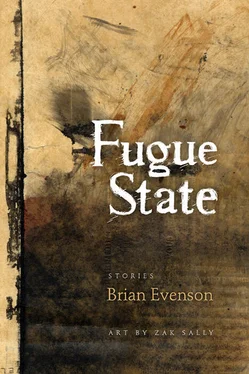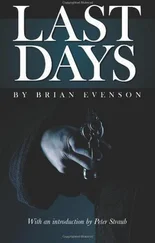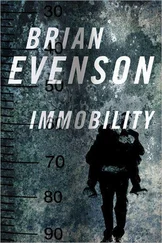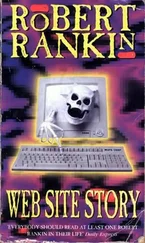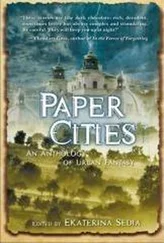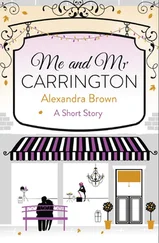II.
Days later, back in the city, having left the mountain inn, the body buried and left behind, Traub found himself shaken. He began to see heads in the emptiness, in all the space that surrounded them, isolated and remote. On the platform in the metro, surrounded by hundreds of people, he saw nothing but a series of heads, each suspended in a vast emptiness, each face in the crowd part and parcel of a single face that was changing with a rapidity he could no longer comprehend — as if a progression in time had been instead smeared out over space, all the faces of the city a record of one man’s death. No matter where he was, he had the distinct impression that there was only he, Traub, sitting beside a bed where a body was slowly giving way, through a desperate flurry of faces, to an implacable and faceless corpse.
III.
How many nights? Traub wondered about himself, night after night, as in the darkness that one face broke into multitudes and spread all about the ceiling separating out until each face was surrounded by a terrifying silence. All around him in the light of the street, the light of the moon, the room was rendered harsh and was taking on at last its true character, its true face: no object, he realized, touched any other — the legs of the chair, weightless, no longer touching the floor; the table too, shimmering and discrete; the curtains not touching the window, but rather each panel riding remote and alone. Everything was its own solitary world, he realized; if he tried to touch something, he would touch nothing. He rode on his bed above a void, was suspended above a solitary world that was a bed in his own solitary world, all of it hanging in a void. He lay there, feeling faces tick across his flesh like a clock, slowly now, but a little faster every day. And who shall draw my profiles? he wondered, no longer certain of who he was. And who shall render all my faces as I die?
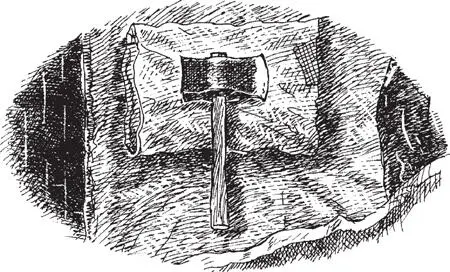
— for Peter Straub
We have been for some time putting our community back into a semblance of body and shape, and longer still sifting the living from the dead. There are so many who seem as alive as you and I (if I may be so bold as to number you, with myself, among the living) but who already are all but dead. Much has been done that would not be done in better times, and I too in desperation have committed what I ought not have, and indeed may well do so again.
I have become too accustomed to the signs and tokens of death. I meet them both in the faces of the living and in the remnants I have encountered in my daily round: the blackened arm my plough turned up and which I just as quickly turned back under again; the bloody marks smeared deep into the grain of the wood of my door and which I have not the fortitude to scrub away; the man who lies dying in the ditch between my farm and my neighbor’s, and who, long dying, somehow still is not altogether dead.
Shall I start at the beginning? No, the end. Here am I, waiting for this same beditched man to either die or lurch to his feet and return to claw again at my door. I have no crops, my entire harvest having been pilfered or razed because of all I have witnessed and done and refused to do. If I am to make it alive to the next harvest, I must carefully pace the consumption of my few remaining stores. I must catch and eat what maggots and voles and vermin I can, glean and forage a little, beg mercy of my neighbors if any are still wont to deliver mercy to the likes of me. And then, if I am lucky, I shall sit here and starve for months, but perhaps not enough to die.
No, let us have the beginning after all: the end is too much with me, its breath already warm and damp on the nape of my neck.
At first there are wars and rumors of wars, then comes a light so bright that it shines through flesh and bone. Then a conflagration, the landscape peeled off and away, and nearly everyone dies. Those who do not die directly find themselves subject to suddenly erupting into pustules and bleeding from every pore and then falling dead. Most of the remainder are subject to a slow madness, their brains softened so as to slosh within their skulls. All but dead, these set about killing those who remain alive.
The few who survive unscathed are those in shelters underground or swaddled deep within a strong house. Or, simply, those who, like myself, seem not to have been afflicted for reasons no one can explain. Everything slides into nothingness and collapse, and for several years we all live like animals or worse, and then slowly we find our footing again. Soon some of us, maybe a few dozen, have banded together into this new order despite the disorder still raging in all quarters. We appoint a leader, a man named Rasmus. We begin to grow our scraggled crops. We form a pact to defend one another unto death.
At times I was approached by those who, having heard that I had been left unscathed in the midst of conflagration, believed I might provide some dark help to them. Others were more wary, keeping their distance as if from one cursed. Most, however, felt neither one thing nor the other, but saw me merely as a member of their community, a comrade-in-arms.
This, then, the fluid state of the world when, of a sudden, everything changed for me in the form of a delegation of men approaching my house. From a distance, I watched them come. The severed arm, having surged up under the sharp prow of the plough, was lying there, its palm open in appeal. Uncertain how they would feel about it, I quickly worked to have it buried again before they arrived.
I watched them come. One of them hallooed me when he saw me watching, and I waved back, then simply stood watching them come. I had grown somberly philosophical by this time, and was not distant enough from the conflagration ever to feel at ease. I still in fact carried a hatchet with me everywhere I went, and even slept with it beside me on the pillow. And it was upon this hatchet that Rasmus’s eyes first alighted once the delegation had approached close enough to form a half-circle about me, and upon the way my hand rested steady on the haft.
“No need for that,” he said. “Today will not be the day you hack me to bits.”
This remark, perhaps lighthearted enough, based no doubt on the rumors of my past and meaning nothing, or at least little, drew my thoughts to the arm buried beneath my feet. I was glad, indeed, that I had again inhumed it.
“Gentlemen,” I said, “to what do I owe this pleasure?” and I opened my pouch to them and offered them of my tobacco.
For a moment we were all of us engaged in stuffing and lighting our pipes, and then sucking them slowly down to ash, Rasmus keeping one finger raised to hold my question in abeyance. When he finished, he knocked the pipe out against the heel of his boot and turned fully toward me.
“We have an assignment for you,” he said.
“The hell you have,” I said.
Or at least wanted to say.
I do not know how to tell a story, a real one, or at least tell it well. Reading back over these pages, I see I have done nothing to give a sense of how it felt to have these determined men looming over me, their eyes strangely steady. Nor of Rasmus, with his wispy beard and red-pocked face. Why did we choose him as a leader? Because he was little good for anything else?
So, a large man, ruddy, looming over me, stabbing the air between us with a thick finger, nail yellow and cracking. Minions to either side of him.
What I said was not The hell you have, but “And it takes six of you to tell me?” Perhaps not, in retrospect, the wisest utterance, and certainly not taken exceptionally well. Not, to be blunt, in the proper community spirit. But once I was started down this path, I had difficulty arresting my career.
Читать дальше
